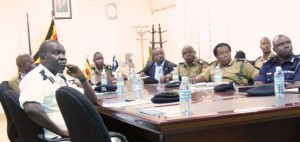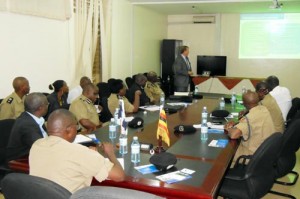Transparency International Uganda invited our defence and security team to assess the country’s needs on anti-corruption police training. Nick Seymour and Sir Stewart Eldon, senior consultants to the defence team, visited Uganda in July. Here’s their account of the experience.
Despite President Museveni’s policy of zero tolerance to corruption, in place since 2006, Uganda has the second highest level of corruption in police in East Africa according to Transparency International’s Bribery Index for the region, after Liberia (86 per cent) and closely followed by Nigeria (78 per cent). The percentage of households that claimed to have paid a bribe to the police in Uganda was 53 per cent in 2009 but increased substantially in 2010, with 79 out of 100 people claiming to have paid bribes to the police.

Ugandan police participate in a meeting with representatives of Transparency International's Defence and Security Programme.
Although the same survey indicated that around two-thirds of people felt the government was not committed to the fight against corruption, the first steps towards reform could be starting to take shape. The Inspector General of the Ugandan Police Force, Lieutenant General Kale Kayihura, and Transparency International Uganda invited a small team from Transparency International’s Defence and Security Programme (Sir Stewart Eldon and myself) to assess the Ugandan Police Force’s needs in order to help them strengthen the anti-corruption elements of their police training. This training is not only beneficial for the officers themselves, but also to the community they aim to protect, as all these efforts will only work if citizens see their police as a clean force ready to protect them when needed.
The first step towards raising awareness of corruption risks is talking openly about them. Senior Ugandan police officers sat down and discussed how challenging it can be to take action against corruption when resources are limited, and how that can undermine ethics and values and actually legitimate corruption as means of survival rather than a form of dishonesty. Despite budget constraints, though, the Ugandan Police Force has been very successful in raising professional standards through their Professional Standards Unit, which has also delivered a large number of successful disciplinary cases and prosecutions related to petty bribes.

The Ugandan public and police both benefit from the training, as measures to improve police accountability can translate to greater public trust in the force.
Improved training represents only one aspect, as the challenge is twofold. On the one hand, personnel must be aware of the consequences of corruption on the ability to operate professionally, and of the need to develop a culture of zero tolerance towards breaches of the code of conduct. On the other hand, the population must see that the police are accountable and operating to clearly understood standards.
The 2011 East African Bribery Index illustrates the problem when the relationship between the police and the population does not achieve this balance. Although the perception of the Uganda Police Force in terms of the prevalence of bribery is high, only one of every ten people is prepared to officially report cases as they see little likelihood of redress.
Public perception matters. Training must thus be visible and accompanied by measures to ensure that accountability is as much an issue for the public as it is for the police. It goes without saying that when talking about bribery, there are always two sides: those who pay them and those who ask for them or accept them. For genuine reform to take place, both sides need to move away from this practice and start making it unacceptable.
Both the police and the community have lots to gain by supporting this reform process. For the police, this is likely to result in improved conditions of service and performance of their functions. For the community, this change helps legitimise the police force as a body in which they can have confidence and which will protect their rights.
Maybe in the near future Uganda could become the security reform example for its African neighbours. Why not? It is, definitely, a possible and inspiring prospect.















 Connect with us on Facebook
Connect with us on Facebook Follow us on Twitter
Follow us on Twitter